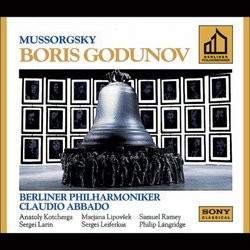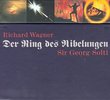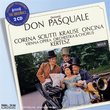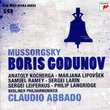| All Artists: Modest Petrovich Mussorgsky, Claudio Abbado, Anatoly Kotscherga, Marjana Lipovsek, Samuel Ramey, Sergej Larin, Sergei Leiferkus, Philip Langridge Title: Mussorgsky - Boris Godunov / Kotscherga, Ramey, Lipovsek, Larin, Leiferkus, Langridge, Abbado Members Wishing: 1 Total Copies: 0 Label: Sony Release Date: 5/3/1994 Genre: Classical Style: Opera & Classical Vocal Number of Discs: 3 SwapaCD Credits: 3 UPC: 074645897721 |
Search - Modest Petrovich Mussorgsky, Claudio Abbado, Anatoly Kotscherga :: Mussorgsky - Boris Godunov / Kotscherga, Ramey, Lipovsek, Larin, Leiferkus, Langridge, Abbado
 | Modest Petrovich Mussorgsky, Claudio Abbado, Anatoly Kotscherga Mussorgsky - Boris Godunov / Kotscherga, Ramey, Lipovsek, Larin, Leiferkus, Langridge, Abbado Genre: Classical
|
Larger Image |
CD DetailsSimilar CDs |
CD ReviewsA dissenting voice Dr Karl | 02/20/2008 (3 out of 5 stars) "Mozart's da Ponte operas and Boris Godunov: The world's four greatest operas, in the view of an old schoolteacher. Boris has been a great favorite since I first heard it in the 1970s, when it was performed in the Rimsky edition, before the acknowledgement of the great merits of the 'original' Mussorgsky edition. It is an opera that is rarely long away from my CD player. I had not listened to the Abaddo version (of the original) for some time though, and I can see why. Listening to it yesterday, shortly after the old Bolshoi version conducted by Mark Ermler (in the Rimsky edition, now cheaply reissued by Regis records), I found some of it short on breath and passion. Listen to the opening chorus, politely sung here by the combined Berlin and Bratislava choirs and compare it with the raw desperation of the Bolshoi chorus, singing as if their lives were at stake. I am surprised by many comments regarding the principals on the Abbado recording. Larin admittedly sings well as the false-Dimitri but approaches many notes from the bottom and is not a match for Vladimir Atlantov, arrogantly heroic in the Bolshoi version, or the young Nicolai Gedda in the old Dobrowen with the incomparable Boris Christoff in the three bass parts of the Czar, Pimen and Varlaam. In the Ermler version the title part is sung magnificently by Evgeni Nesterenko who brings a real beauty of tone to the part as well as exceptional vocal acting. I really cannot share the enthusiasm of other reviewers for Kotscherga's assumption of the title part in the Abbado recording. To my ears, his 'tormented' sound is ugly. He rarely sings above piano, deptiving the character of any heroic stature or noble grandeur; his voice lacks a centre and, to my ears, is dripping with self-pity rather than anguish or guilt - he frequently sounds like a conventional villain, adding to the number of villains in this great opera (Shuisky, Dimitri and, of course, the Jesuit Rangoni). In fact, he makes a sound more suited to the part of Rangoni, insinuating, ugly and persistent, rather than the proud, heroic, if tormented one that we expect from Boris. In fact, I would go as far as to say that of the many assumptions of the role of Boris, I can only think of Raimondi's ill-conceived and dreadfully sung performance for Rostropovich giving less satisfaction than Kotscherga's. I found Lipovsek to be the best of the principals in this version, but she too cannot resist making ugly sounds when the emotion operpowers her (although admittedly not as ugly as Elena Obratzova on the Bolshoi version or Vishneskaia in the admirable Karajan version. Less important parts, notably Shuiski and the Simpleton are very well sung. About Abaddo's conducting, there can be no question-marks - it is good throughout. I particularly liked his account of the confrontation between Boris and the Simpleton in fron of St Basil's church; by this point, the combined choruses have roused themselves to some genuine pathos and the effect is riveting. Unfortunately, the death of Boris scene that immediately follows it, is once again spoilt (for me) by Kotscherga's centre-less, oily singing. I admit to not having heard the Gergiev twin version, but, if I wanted a version of the original Mussorgsky edition, I would go to the Semkov version (with with the beautiful bass of Marti Talvela), now cheaply repackaged, or the Fedoseyev version (with the aging but competent Alexander Vedernikov in the title part). Rimsky's edition has generated embarrassment of riches - the two Christoff versions, Karajan and Ermler. Abaddo's version will not be visiting my CD player soon, in spite of the conductor's command of the score. If you are tempted to buy it, may I suggest that you fist buy tracks 6, 19 and 20 of the second disc as downloads, and, if you like them, go ahead and buy the set." The agony of evil isn't here--but everything else is Santa Fe Listener | Santa Fe, NM USA | 09/28/2005 (5 out of 5 stars) "For svirtuosic playing and excellent sound, I agree with the reviewer who picks this version of the Shostakovich edition (working from Mussorgsky's original orchestration) and the Karajan for Rimsky-Korsakov's more "civilzed" reorchestration. I think we're past the time when only one or the other can be approved; each is wonderful in its own way. I just wanted to add that in theater tradition Boris is an agonized, guilty monster, a Czar who used murder to gain his throne. He attracts sympathy through overt suffering, not for any sympathetic quality other than love of his son. To portray this agony is essential, and it is almost impossible to overplay it so far as Russian audiences are concerned. Even the scenery-chewing Boris Christoff, who practically gets hysterical in the clock and death scenes, is actually right in line. Abbado's Boris, the estimable Anatoly Kotcherga, I find rather cool and restrained when it comes to guilt-ridden agony, but the overall cast is so good--especially Dmitri and Marina, who tend to be awful on Soviet recordings--that I agree wholeheartedly with the amazon reviewer. This is a Boris to live with for a long time to come." Full and glowing Sam | Seahurst, Washington | 12/11/2007 (5 out of 5 stars) "Caludio Abbado recorded Boris Godunov in its original version with speeds that regularly press ahead, and the urgency of the composer's inspiration is conveyed without reducing the epic scale of the work or its ominously dark coloring. Abbado inserts the beautiful scene in front of St. Basil's at the start of Act IV, but then omits from the final Kromy Forest scene the episode about the Simpleton losing his kipek, which would otherwise come in twice--as it does in the Semkow (EMI) set. Vocally, the performance centers on the glorious singing of Anatoly Kotcherga as Boris. Rarely has this music been sung with such firmness and beauty as here. Kotcherga may not have as weighty a voice as Talvela on EMI, but the darkly meditative depth of the performance is enhanced without loss of power. The other principal basses, Samuel Ramey as the monk, Pimen, and Gleb Nikolsky as Varlaam, are well contrasted, even if Ramey's voice sounds un-slavonic. The tenor, Sergei Larin, sings with beauty and clarity up to the highest register as the Pretender, not least in the Polish Act, while Margana Lipovsek is a formidably characterful Marina, if not quite as well focused as usual. Having Philip Langridge as Shuisky and Sergei Leiferkus as Rangoni reinforces the starry strength of the team. The sound is spacious, fuller of character than usual in recordings made in the Philharmonic in Berlin, and allowing high dynamic contrasts, with the choral ensembles--so vital in this work."
|

 Track Listings (28) - Disc #1
Track Listings (28) - Disc #1



